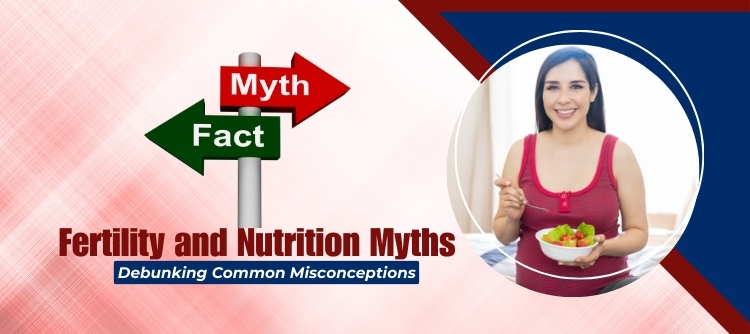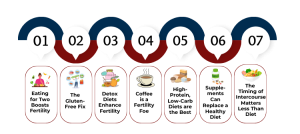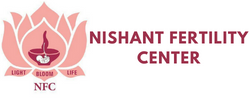Fertility and Nutrition Myths: Debunking Common Misconceptions

Fertility and nutrition are intricately linked, but navigating the sea of information can often lead to confusion. At Nishant IVF Care, we believe that separating fact from fiction is crucial for individuals trying to conceive. Let’s address three common myths surrounding fertility and nutrition.
Myth 1: Eating for Two Boosts Fertility
One of the most pervasive misconceptions is that eating more food, or “eating for two,” will improve fertility. This notion is often tied to the idea that more nutrition equates to better reproductive health. However, this is far from the truth.
• The Facts: Fertility is more about balance than excess. Maintaining a healthy body weight is crucial, as being overweight or underweight can both negatively impact fertility. Consuming nutrient-dense foods is key, but overeating or drastically increasing calorie intake won’t boost your chances of conception. Instead, it can lead to weight gain and potential health complications, which may make conception harder.
• What You Can Do: Focus on a balanced diet rich in fruits, vegetables, whole grains, lean proteins, and healthy fats. Consulting a fertility specialist or dietitian can help tailor a diet to your unique needs without overindulging.
Myth 2: The Gluten-Free Fix
In recent years, going gluten-free has become a popular trend, and some claim that it boosts fertility. The belief is that eliminating gluten, a protein found in wheat, barley, and rye, can solve fertility issues, even without a diagnosis of gluten sensitivity or celiac disease.
• The Facts: While a gluten-free diet is essential for those with celiac disease, there is no substantial evidence to support that gluten elimination will enhance fertility for everyone. For individuals without gluten intolerance, going gluten-free could limit access to important nutrients like fiber, iron, and B-vitamins, which are vital for reproductive health.
• What You Can Do: Unless diagnosed with celiac disease or gluten sensitivity, there is no need to avoid gluten for fertility purposes. Instead, focus on whole grains like quinoa, oats, and brown rice, which provide essential nutrients that support overall reproductive health.
Myth 3: Detox Diets Enhance Fertility
Detox diets, often marketed as a way to “cleanse” the body and enhance fertility, have become increasingly popular. These diets claim that by eliminating toxins, you can reset your reproductive system and improve your chances of conceiving.
• The Facts: The human body is designed to detoxify naturally through the liver, kidneys, and digestive system. Extreme detox diets, which often involve fasting or consuming only certain juices, can deprive the body of essential nutrients. Instead of improving fertility, these diets may cause hormonal imbalances or nutritional deficiencies that hinder reproductive health.
• What You Can Do: Rather than relying on extreme diets, support your body’s natural detoxification processes by eating a nutrient-rich diet, staying hydrated, and incorporating regular physical activity. These habits promote overall well-being and support reproductive health without the need for restrictive cleanses.
Myth 4: Coffee is a Fertility Foe
A common belief is that consuming coffee negatively impacts fertility, leading many to eliminate it from their diets when trying to conceive.
• The Facts: Moderate caffeine consumption—about 200-300 milligrams per day, or one to two cups of coffee—has not been conclusively linked to reduced fertility. However, excessive caffeine intake (over 500 mg daily) may increase the risk of miscarriage or make conception more difficult. The key here is moderation.
• What You Can Do: Enjoy your coffee, but be mindful of your intake. Limit caffeine to a moderate level, and if you’re concerned about the effects on fertility, switch to alternatives like herbal teas or decaf options. Keep in mind that other sources, like soft drinks, energy drinks, and certain medications, also contain caffeine.
Myth 5: High-Protein, Low-Carb Diets are the Best
High-protein, low-carb diets have gained popularity, particularly in weight loss circles. Some believe these diets can enhance fertility, claiming that reducing carbohydrates and increasing protein intake promotes reproductive health.
• The Facts: While a diet balanced in macronutrients (proteins, fats, and carbs) is essential for overall health, extremely low-carb or high-protein diets may not be ideal for fertility. Carbohydrates provide energy and support hormone production, both of which are vital for reproductive function. On the other hand, too much protein, particularly from animal sources, may negatively affect hormone levels and increase acidity in the body, which could hinder conception.
• What You Can Do: Focus on balanced meals that include healthy sources of protein, such as lean meats, fish, eggs, and plant-based options, along with complex carbohydrates like whole grains, fruits, and vegetables. Ensuring variety in your diet will help you get the nutrients necessary for supporting fertility.
Myth 6: Supplements Can Replace a Healthy Diet
With an overwhelming number of fertility supplements on the market, it’s tempting to believe that taking these pills can compensate for a poor diet. The idea that supplements alone can boost fertility without the need for proper nutrition is a common misconception.
• The Facts: While some supplements, like folic acid, vitamin D, and prenatal vitamins, play a supportive role in fertility, they are not a substitute for a healthy, balanced diet. Supplements cannot match the diversity of nutrients and antioxidants found in whole foods. Over-relying on supplements without focusing on a nutrient-rich diet may leave gaps in key areas of nutrition, affecting both general health and fertility.
• What You Can Do: Use supplements to complement, not replace, a well-rounded diet. Consult a fertility specialist or dietitian to determine which supplements, if any, are necessary for your specific health needs. Prioritize fresh, nutrient-dense foods and maintain a balanced diet to optimize fertility naturally.
Myth 7: The Timing of Intercourse Matters Less Than Diet
There is a common belief that focusing solely on diet while neglecting the timing of intercourse will suffice in improving fertility. While a healthy diet is undoubtedly important, the timing of intercourse plays a critical role when trying to conceive.
• The Facts: Fertility depends on more than just nutrition. While maintaining a balanced diet can support reproductive health, the timing of intercourse relative to ovulation remains one of the most significant factors in conception. Sperm can survive in the female reproductive system for up to five days, but the egg is viable for only 12–24 hours after ovulation. Therefore, having intercourse during the “fertile window”—the five days leading up to ovulation and the day of ovulation itself—substantially increases the chances of conception.
• What You Can Do: While continuing to eat nutrient-rich foods, pay close attention to your cycle and track ovulation using methods such as ovulation predictor kits, tracking basal body temperature, or monitoring cervical mucus. A combination of a healthy lifestyle and optimal timing of intercourse can improve the chances of conception.

Conclusion
In the journey toward conception, understanding the myths surrounding fertility and nutrition is key. While it’s easy to focus on diet, factors like the timing of intercourse are equally, if not more, important for maximizing fertility. At Nishant IVF Care, we offer expert guidance on all aspects of fertility—from nutritional advice to understanding the best time for conception.
When trying to conceive, both diet and the timing of intercourse should be considered together, along with other lifestyle factors such as stress management and regular physical activity. If you’re unsure where to begin, consulting with a fertility expert is the best way forward.
At Nishant IVF Care, the best IVF center in Jaipur, our experienced specialists are committed to providing you with the best possible care, guiding you through each step of your fertility journey with personalized advice and advanced treatments.
